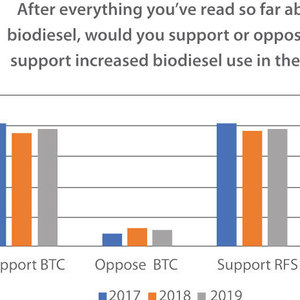National Voter Survey Shows Strong Support for Biodiesel Industry

December 31, 2019
BY The National Biodiesel Board
Each year the National Biodiesel Board communications team conducts online surveys of U.S. voters to track trends, gauge awareness of biodiesel, and see what messages resonate with consumers. “Awareness and positive impressions of biodiesel among key audiences remain critical to maintaining support for the industry,” said Kaleb Little, NBB’s communications director.
This year the poll gathered responses from 1,064 registered voters across the country and showed consistent results with prior polling from 2017 and 2018.
In September 2019, 73% of respondents said they were aware of biodiesel. The demographics most likely to have heard of biodiesel included individuals with a household income of $75,000-$99,000 (86%), men age 18-34 (86%), voters employed full-time (80%), and college and post-grads (79%). While 2019’s 73% awareness is significantly better than NBB’s first survey of just 27% awareness in June 2004, it is below peak awareness of 86% in September 2009.
Along with awareness, 2019 respondents had 54% positive and only 3% negative impressions of biodiesel, with 44% saying no opinion or don’t know. While NBB would like to see higher positive opinions, a 3% negative impression is extremely low. Additionally, there is a drastic difference in positive impressions in those familiar with biodiesel vs. those not familiar—71% positive in those familiar compared to just 35% positive in those unfamiliar.
“The annual national poll also looked at awareness of and attitudes toward biodiesel in federal policies that support the industry,” Little explained. “The results show a candidate’s support for policies to promote clean energy, including biodiesel and renewable diesel use, can influence votes.”
Among the respondents, more than half (57%) of all respondents agreed that federal policy should encourage use of biodiesel and renewable diesel. When asked about issues that affect their votes, a strong majority of the polled registered voters (81%) indicated that a candidate’s position on renewable fuels is important. Overall, 86% of respondents indicated that a candidate’s position on clean energy is important or very important to their voting preferences. Further, 85% of respondents agreed it is important that President Donald Trump keep his promises on the Renewable Fuel Standard.
When informed that biodiesel is America’s first and most widely available advanced biofuel and has demonstrated environmental benefits, more than three-quarters (76%) of respondents supported increased use. High percentages of respondents agreed that the government should “stand with American workers, manufacturers, rural economies and businesses” to support a clean fuels industry (83%) and “follow the law to implement an existing mandate that creates jobs and economic development across the country” (82%).
Nearly four of every five respondents expressed support for existing federal programs that encourage increased production and use of advanced biofuels. Seventy-eight percent of respondents support the federal tax incentive for biodiesel, and 79% support the RFS. Additionally, 79% of respondents would encourage local communities and governments to promote use of biodiesel.
“If awareness equates so strongly to positive impressions, we must increase biodiesel awareness to increase support,” Little said. “This is why NBB is so driven to amplify biodiesel messaging and raise industry voices to span across the country.”
Advertisement
Advertisement
Advertisement
Advertisement
Related Stories
The USDA has announced it will delay opening the first quarterly grant application window for FY 2026 REAP funding. The agency cited both an application backlog and the need to disincentivize solar projects as reasons for the delay.
CoBank’s latest quarterly research report, released July 10, highlights current uncertainty around the implementation of three biofuel policies, RFS RVOs, small refinery exemptions (SREs) and the 45Z clean fuels production tax credit.
The U.S. EPA on July 8 hosted virtual public hearing to gather input on the agency’s recently released proposed rule to set 2026 and 2027 RFS RVOs. Members of the biofuel industry were among those to offer testimony during the event.
The USDA’s Risk Management Agency is implementing multiple changes to the Camelina pilot insurance program for the 2026 and succeeding crop years. The changes will expand coverage options and provide greater flexibility for producers.
President Trump on July 4 signed the “One Big Beautiful Bill Act.” The legislation extends and updates the 45Z credit and revives a tax credit benefiting small biodiesel producers but repeals several other bioenergy-related tax incentives.
Upcoming Events










